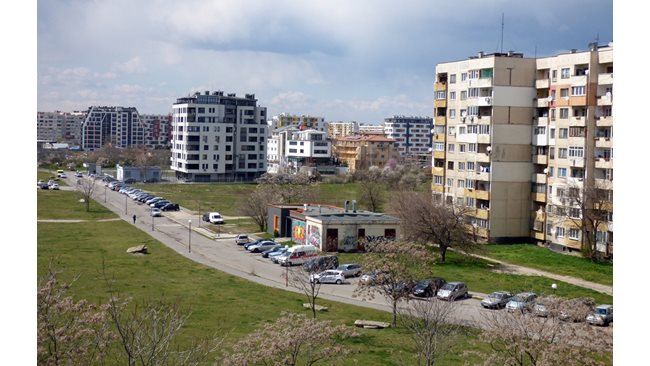After Christmas, individuals and companies for each available amount over BGN 200,000 will pay between 0.7 and 1%
For about a month now, the real estate market has been booming, coming from a slightly unexpected direction – more and more rich Bulgarians are thinking about how to part with their cash in banks. And since one of the few alternatives to what to do with the money is to buy a property, the focus is on that.
The reason is that one by one the banks are starting to warn companies and individuals with large sums on their accounts that
from Christmas
introduces a fee
“Oversupply”
It is different for different amounts.
In two of the largest banks in Bulgaria they have decided to take 0.7% for all amounts over BGN 400,000. In another they have warned their clients – individuals and legal entities, that from the New Year they will tax the stocks over BGN 1 million with fee of 1% per year. There is also a bank that imposes 0.7% on amounts over BGN 200,000.
A financier said that his clients had already called with a question about a property because the bank had warned them that it charged 0.8% for cash over BGN 600,000.
The reason for the fees is basically that
banks have
too
lots of money,
as the main part of the tach is kept on deposit with the BNB, and the central bank does not give interest, on the contrary – it charges fees for keeping the money.
All this increases the demand for real estate. According to the credit consultant Tihomir Toshev, the tendency to buy real estate for investment purposes has not yet manifested itself and the largest group of real estate buyers so far continues to be
the people who
buy
bigger
housing
This has been a trend since the state of emergency last year, when many people found it difficult to combine a home office with children’s online education in one home.
“In second place are people who buy a first home, for example, now they come to a new settlement or for the first time separate from their parents,” said Toshev. However, his focus is on people who buy a property with a mortgage, not those who will pay in full cash. However, he also reports an increase in property inquiries from people who have cash and just want to save it.
A property expert told “24 Chasa” that he had just confessed to a deal for a property he had bought precisely because
he’s fine
imposed
to download
your savings
“I got a call from the bank that they were introducing such a fee, and in a short time I managed to do just that – to buy a property for half the amount, and for the other I found a safe. So far, the interest rate on this money has been close to zero, but to pay 0.7% seems too much to me. “Whatever happens on the market, the home will bring at least 3% annual yield,” he said.
According to the manager of Bulgarian Properties Polina Stoykova, there is another interesting trend in the housing market related to homes purchased for investment purposes. “Many
prefer
to keep them
empty,
even though they gain nothing that way. I have many cases of such homes in new complexes – they were bought 5 years ago, obviously in order to profit from them, because they were not customers in need of housing. But neither they rent them out, nor – for 5 years after the deal, they sell them. “Obviously they don’t need money or they just can’t find another use for that money, and they don’t want to keep it in a bank that will already burden them with new fees,” Stoykova said.
According to her, the burden of the new fees is mainly for the companies, because for an individual BGN 500-600 thousand is a large amount, but even for medium-sized companies this is a common stock, from which they will already lose.
According to various experts, about one tenth of real estate transactions this year are already for purely investment purposes
This is a small percentage compared to what happened before the great financial crisis, when almost a quarter of transactions were such. But if bank taxation continues at the current rate, they say one-fifth of the deals are likely to be.
By the way, not all people keep the apartments bought for investment purposes empty. Rental sites and especially Facebook groups set up for this purpose,
overflow from
housing ads
in new
cooperation,
apparently bought very recently. A quick review of the ads, at least for the capital, shows that almost every third refers to homes in neighborhoods such as “Manastirski Livadi”, “Krastova Vada”, “Vitosha”, and a large part of them are newly furnished, ie. are rented for the first time.
The profitability of rental housing is already falling, but is far higher than the profitability of a bank deposit. According to experts
she moves
between 2.8
and 4.2 percent
and depends mostly on the type of dwelling.
In the mass case it is about 3.5% per year. Only for individual luxury homes – for example, villas at the foot of Vitosha Mountain or prestigious apartments in the center, which are usually rented to foreign companies or embassies, can reach and even exceed 5% per year. But the value of such homes, if they are yet to be bought, is very high and usually approaches and even exceeds BGN 1 million.
Dwellings with between 2 and 3% annual yields are usually bought at least in part with a mortgage loan, and according to the latest BNB data, their size continues to grow rapidly. Towards the end of August
the sum of all
housing loans
amounted to
BGN 13.3 billion
and for a year has increased by 1.8 billion. And only in August new BGN 200 million mortgage loans were drawn.
The reason for the credit boom is also the low interest rates. In the case of housing loans to individuals in BGN, the average interest rate in August fell by a new 0.03 percentage points and is now 2.7%, and the APR on them, ie. the total cost of such a loan is again below 3% – 2.98%.
However, it should be borne in mind that banks also provide loans for the purchase of housing with a lower appreciation rate, especially if the amount is larger and especially
if the candidate
for credit
is stable
and high incomes
There are cases of such loans on the market with almost 2% or just above this level.
In addition, all barriers to the co-financing rate of a home purchase transaction have recently fallen, and there are still cases, as before 2010, where banks provide 100% financing, although part of the amount is granted in the form of a consumer loan.
The average values of consumer loans also fell in August to 8.4%, and the APR on these loans was 8.95%.
Usually, however, on request, commercial banks offer a maximum of 80% of the purchase price of the home in the form of a mortgage loan, and if it is still unbuilt housing, the percentage drops to 60%. However, if a loan application is submitted and the documents required by the bank are submitted, a new proposal often follows, much more advantageous than the first one.
The housing crisis is looming worldwide
Rising property prices around the world are forcing people to give up their hopes of owning a home, especially Generations Y and Z. The consequences are already affecting politics and there are cases of governments falling for these reasons. , reported Bloomberg.
“We are watching groups in society being excluded from parts of our city because they can no longer afford apartments. This applies to London, Paris, Rome, and now, unfortunately, more and more to Berlin, “the agency quoted Mayor Michael Mueller.
This exclusion is rapidly turning the housing market into the new red line in politics with unpredictable consequences. Politicians throw
any ideas for resolving
the problem – from the ceiling on rents
to special taxes for owners
of real estate, nationalization of private property or conversion of empty offices into housing. But nowhere in the world is there an easy or sustainable solution.
In South Korea, for example, President Moon Jae-in’s party lost the local election this year after failing to cope with a 90% rise in average apartment prices in Seoul.
China has tightened restrictions on the real estate sector this year and rumors of a property tax are rising in order to lower prices. As of July, the price of an apartment in Shenzhen, China’s answer to Silicon Valley, is 43.5 times the average salary of a local.
In Canada, Prime Minister Justin Trudeau has promised a two-year ban on buying property from foreigners if re-elected.
The Swedish government collapsed in June after proposing changes that would abolish traditional controls and allow more rents to be set by the market.
In Berlin, an attempt to curb rental growth was overturned by a court. Activists have collected enough signatures to hold a referendum on the seizure of property from large private owners.
City officials announced Friday,
that they will buy nearly 15 thousand.
apartments of two large
corporate owners
for EUR 2.46 billion,
to expand supply.
The pandemic has pushed the housing market to new highs over the past 18 months through a combination of ultra-low interest rates, insufficient housing construction, a change in family spending and fewer homes for sale.
In the United States, where nominal house prices are more than 30% higher than their previous highs in the middle of the first decade of the 21st century, federal policies aimed at improving affordability and promoting housing ownership may push prices even higher, warned Don Leighton, former CEO of US mortgage giant Freddie Mac.
– .


